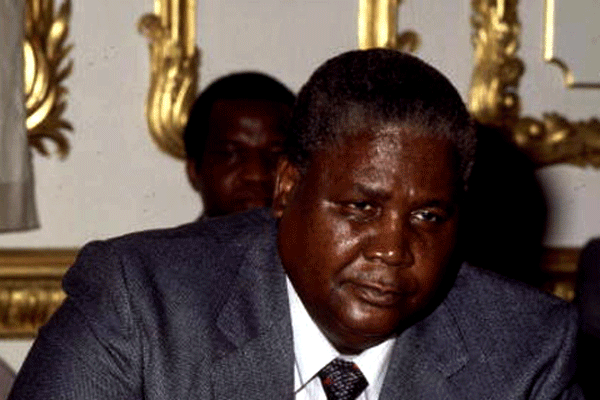
Hero status is not accorded by anyone to anyone. It is earned. Good works speak for themselves and need no Zanu PF politburo comminique to endorse. This was even buttressed by Dr Joshua Nkomo after the death of veteran nationalist Cde Lookout Masuku.
By Wilton Nyasha Machimbira,Our Reader

On July 1 1999 the people of Zimbabwe lost a father, a leader and a vice-president. Nkomo was one one such a figure of towering integrity and unparalled credibility. He was a fountain of wisdom and an oasis of love. Father Zimbabwe was one such leader with foresight. Every effective leader must have foresight so as to be in a position to surmount and negotiate any form of difficulty that might be encountered along the way. It is because of lack of foresight that we find Zimbabwe engulfed by political and economic miasma. A miasma of claustrophobic proportions.
Reading a letter penned by the late Father Zimbabwe after the Gukurahundi debacle to the then Prime Minister Robert Mugabe, one can effortlessly detect that the issues he wanted to be addressed are still prevalent in the present day Zimbabwe. Issues to do with good governance, hate speech, peace and empowerment. Good governance is one of the most canvassed concerns in the global village.
One wonders why Zanu PF seems to be allergic to good governance. Why the Zanu PF leadership flagrantly flout the cardinal principles of good governance and cry foul when the ripple effects manifest themselves economically. Why does the Zanu PF leadership frown upon hearing the term good governance? Why do they extol the virtues of nationalistic ideologies on the altar of good governance?
“You have stated publicly on several occasions that I have plotted, and continue to plot, to overthrow you and your government, that I have conspired, and continue to conspire, with South Africa to do that, that I have organised and continue to organise dissident groups for the purpose of destabilising the country and finally to overthrow you” wrote Nkomo.
This was a passionate plea by Nkomo to the then Prime Minister, distancing himself and desperately refuting the spurious allegations that were being levelled against him of plotting to overthrow the government. This was after the discovery of the arms cache in Zapu properties. Both Zanu and Zapu had cached weapons in 1980 as they did not trust Ian Smith and the Rhodesians. Possibly it was still early for Nkomo and the masses to understand the political modus operandi of Zanu PF which entail character assassination and projection of red-herrings to advance devilish and diabolical political agendas.
Upon reading the letter by Nkomo one can come to terms with the fact that Zanu PF has a long history of political violence and duplicity, in fact political violence is the oxygen of the party. The history of the party is littered with a litany of violent episodes to capture and retain power and power alone.
- Chamisa under fire over US$120K donation
- Mavhunga puts DeMbare into Chibuku quarterfinals
- Pension funds bet on Cabora Bassa oilfields
- Councils defy govt fire tender directive
Keep Reading
Zanu PF ’s obsession with conscipiracy theories dates back to eary 1980. They see shadows everywhere and their level of paranoia is sickening. This explains why almost every political rival was charged with treason from Nkomo, Lookout Masuku, Dumiso Dabengwa, Ndabaningi Sithole to Morgan Tsvangirai and Tendai Biti. Everyone who does not sing from the same hymn with them is a traitor who deserve to be charged with treason. Such is their retrogressive politics. Politics ought to be a theatre for osmosis of ideas and not a battlefield.
The people of Zimbabwe still yearn for the enjoyment of the fruits of independence which include, although not limited, to legal protection. Laws are put in place to protect the masses, to thwart any possibility of Hobbesian State of nature where life will be “brutish, short and nasty”. In his book The story of my life, Nkomo bemoaned the use of Law and Order Maintenance Act retained by the Mugabe led government. It was draconian piece of legislation that was used by the colonial regime to paralyse the activities of liberation movements and the will of the people. The present day Zanu PF-led government still has the penchant of using such laws to achieve political ends, to suppress and oppress people which is an antithessis of the values of the liberation struggle.
It is important for the youth of the day to emulate the selfless sacrifices made by gallant nationalists like Nkomo. He was neither a run-off-the-mill politician nor a desktop revolutionary. He was in the trenches with others. Yes historical achievements should not instill a sense of entitlement. Upon being invited to take up the post of ceremonial Presidency after the 1980 elections, Nkomo turned down the offer which I believe would have turned to be a poisoned chalice. He wrote in his book, The Story of My Life: “For me, acceptance of the presidency would have meant retreating into an official prison, deprived of my right to speak my mind and take a lead on matters of great national importance. I had spent too much of my life in prisons for that to be attractive, or even possible. I was obliged to decline.”
No amount of propaganda will trivialise the role played by Nkomo in ushering a new dispensation in Zimbabwe. It’s foolhardy for anyone to project an uncanny impression that Zapu was more of a fringe regional party. It is heartless for anyone to effusively shower melodious eulogies on Nkomo for the purposes of electioneering and wooing votes from Matebeleland regions. The nation need to rekindle the values preached and propagated by Nkomo, that is unity, love and peace.
This is the man who accepted an olive branch from Robert Mugabe and signed the Unity Accord in 1987. He decided to let bygones be bygones. How many of us can let bygones be bygones after such years of bitter acrimony? They wanted to gain political capital by appearing to be magnanimous. He wanted peace, harmony and solidarity. A man who would rather sacrifice personal political interests than let his people die and the country descend into chaos. A rare quality of leadership. Long live the spirit of Umdala Wethu!











